 Expert's opinion
Expert's opinion
Expert's opinion
The article is a subjective view on this topic written by writers specializing in medical writing.
It may reflect on a personal journey surrounding struggles with an illness or medical condition, involve product comparisons, diet considerations, or other health-related opinions.
Although the view is entirely that of the writer, it is based on academic experiences and scientific research they have conducted; it is fact-checked by a team of degreed medical experts, and validated by sources attached to the article.
The numbers in parenthesis (1,2,3) will take you to clickable links to related scientific papers.
Essential Oils For Hair Growth And Healthy Scalp In 2024
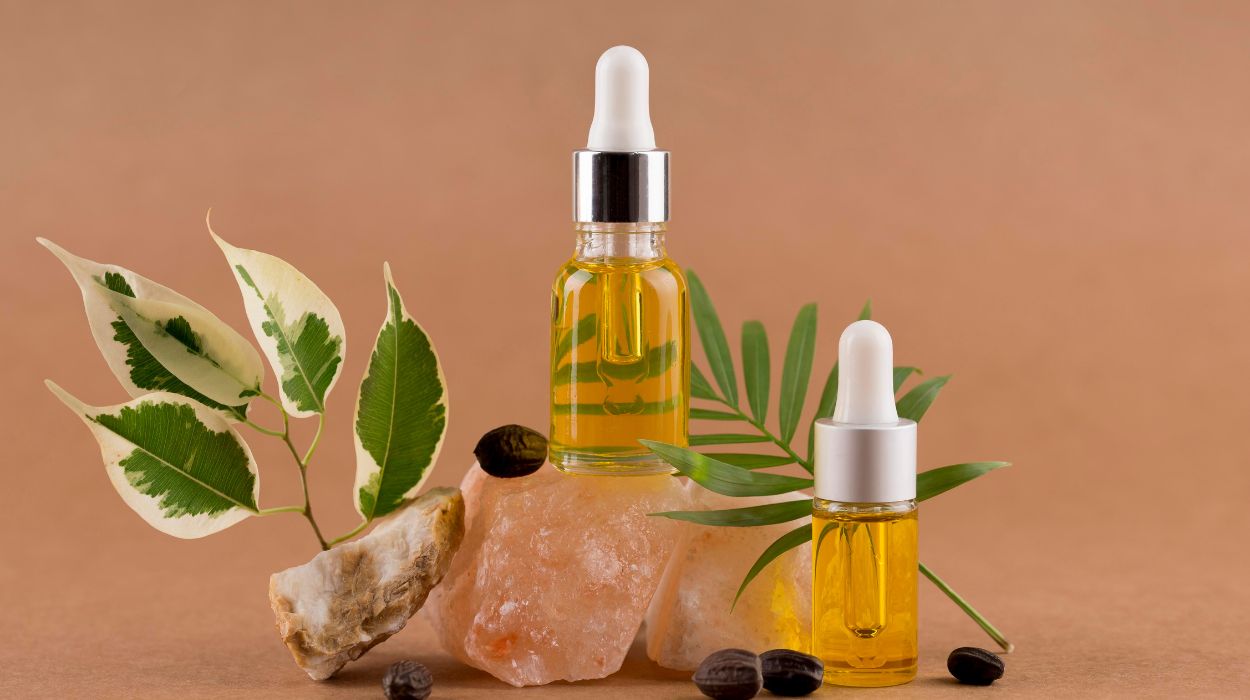
Have you noticed how essential oils have taken the world by storm lately? It seems everyone is talking about the amazing benefits of these natural wonders–from relieving stress to boosting immunity. But did you know that essential oils can also work wonders for your hair?
These potent, aromatic liquids are extracted from various parts of plants, like flowers, leaves, and bark, through distillation. The result is a highly concentrated essence of the plant, which contains all its beneficial properties.
Now, people are discovering how to use essential oils for hair regrowth and maintenance. Here, we will explore the seven best essential oils for hair growth and scalp health. We will see their benefits and how to mix oils for hair growth and thickness.
7 Best Essential Oils For Hair Growth
Essential oils are beneficial for various reasons. Here are the seven best essential oils for hair growth:
- Lavender
- Rosemary
- Cedarwood
- Clary sage
- Peppermint
- Thyme
- Tea tree
7 Essential Oils For Hair
Here are the best seven oils for hair growth and thickness:
Lavender Essential Oil
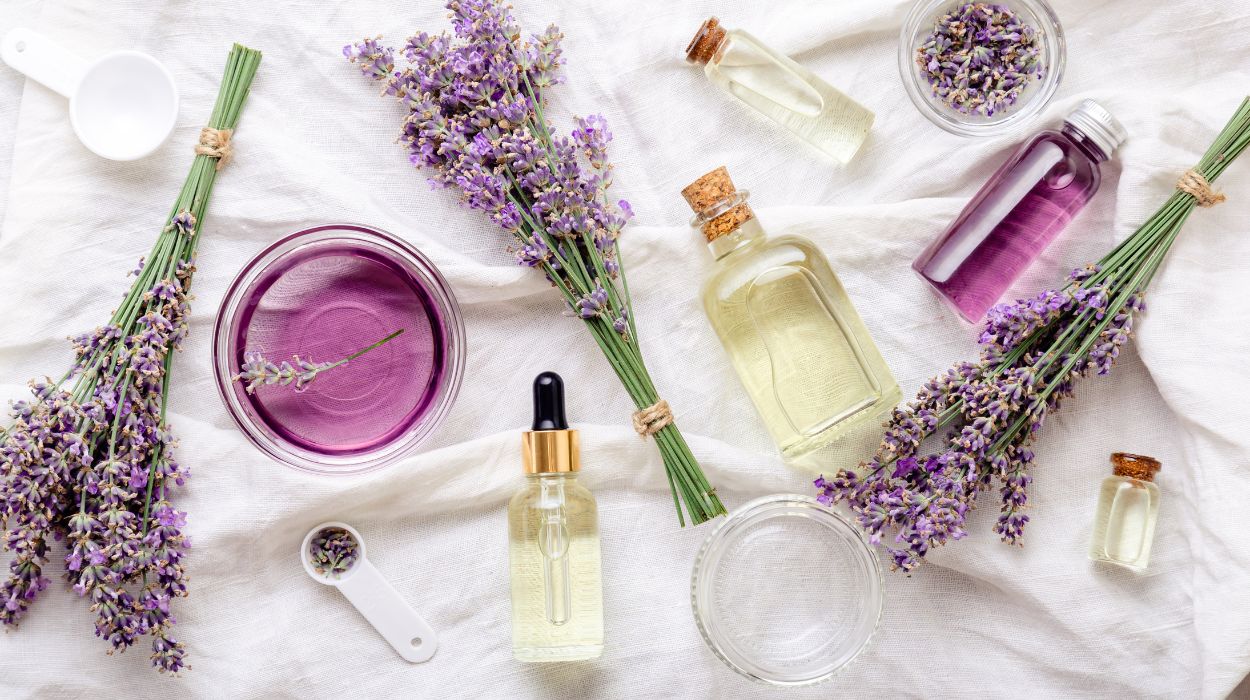
Lavender oil was one of the first essential oils used in hair growth. It is one of the major superfoods for hair. The primary benefit of lavender oil is that it is the best oil for hair growth. Lavender oil promotes hair growth by increasing blood circulation[3] in the scalp. Doing so reduces hair loss. It also has antibacterial effects to fight infections like eczema and dandruff. Lavender also supports collagen production. Collagen is useful for maintaining and rejuvenating the scalp.[6]
Rosemary Essential Oil
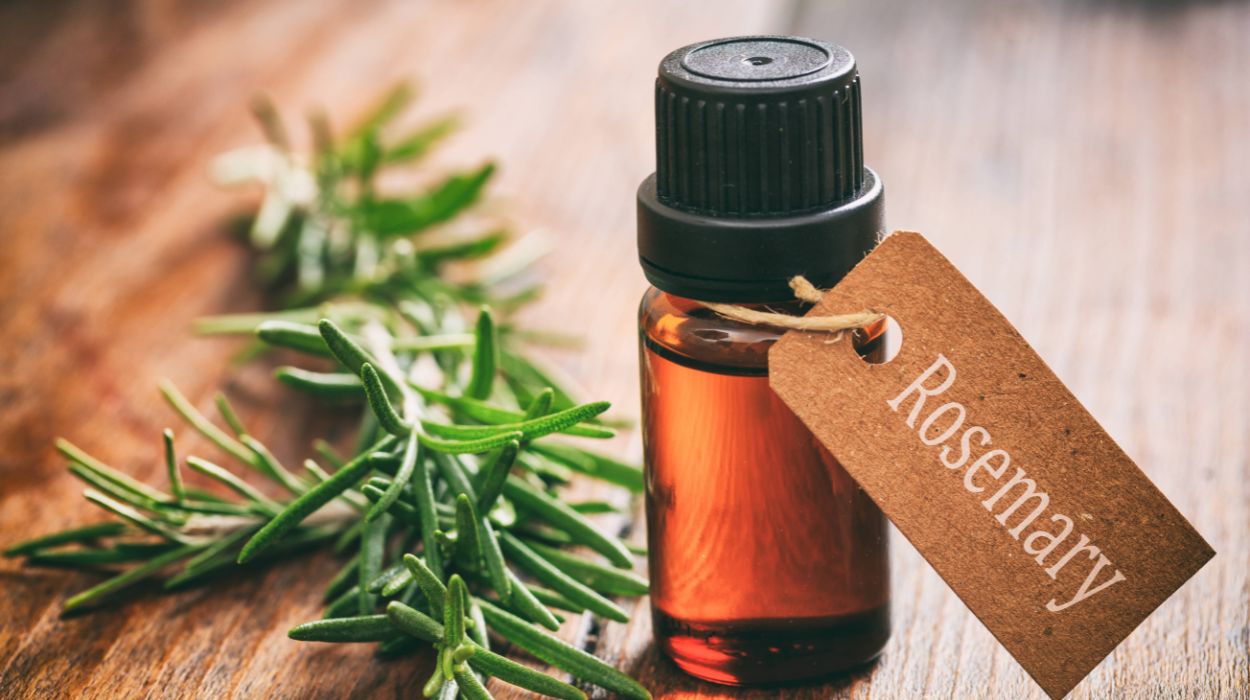
This is another highly beneficial oil used for centuries in traditional medicine and aromatherapy. It is extracted from the leaves of the rosemary plant through steam distillation and has a fresh, herbal scent. If you need oils for thicker hair and better scalp health, rosemary is one of your best options.
Its mechanism is also quite exciting. Research has shown that rosemary oil promotes hair growth by inhibiting the effects of dihydrotestosterone,[7] a form of testosterone that is often responsible for decreasing hair follicles and contributing to hair loss. Another study noted that rosemary was just as effective as minoxidil in treating alopecia.[4]
Cedarwood Essential Oil
Cedarwood oil is derived from the wood of the cedar tree and has many potential health benefits. Research also shows that cedarwood oil has been used for centuries for its antifungal, antiseptic, and antibacterial properties.[8] This benefit allows it to find use in treating various hair-related conditions.
Clary Sage Essential Oil
Clary sage oil has been proven beneficial for hair growth and maintenance. It contains lavender oil and a touch of sunny citrus. The active ingredient, linalyl acetate, causes natural oil production on the scalp,[9] thereby maintaining a moderate texture to improve scalp health, thus promoting improved growth.
Additionally, clary sage oil improves blood circulation and fights bacteria – giving the hair a healthy, thicker growth, which minimizes hair loss and strengthens hair to increase shine. Furthermore, it has been suggested that the soothing benefits of oils like clary sage oil can help reduce stress-induced hair loss.[10] So, it is one of the best essential oils for hair loss treatments.
Peppermint Essential Oil
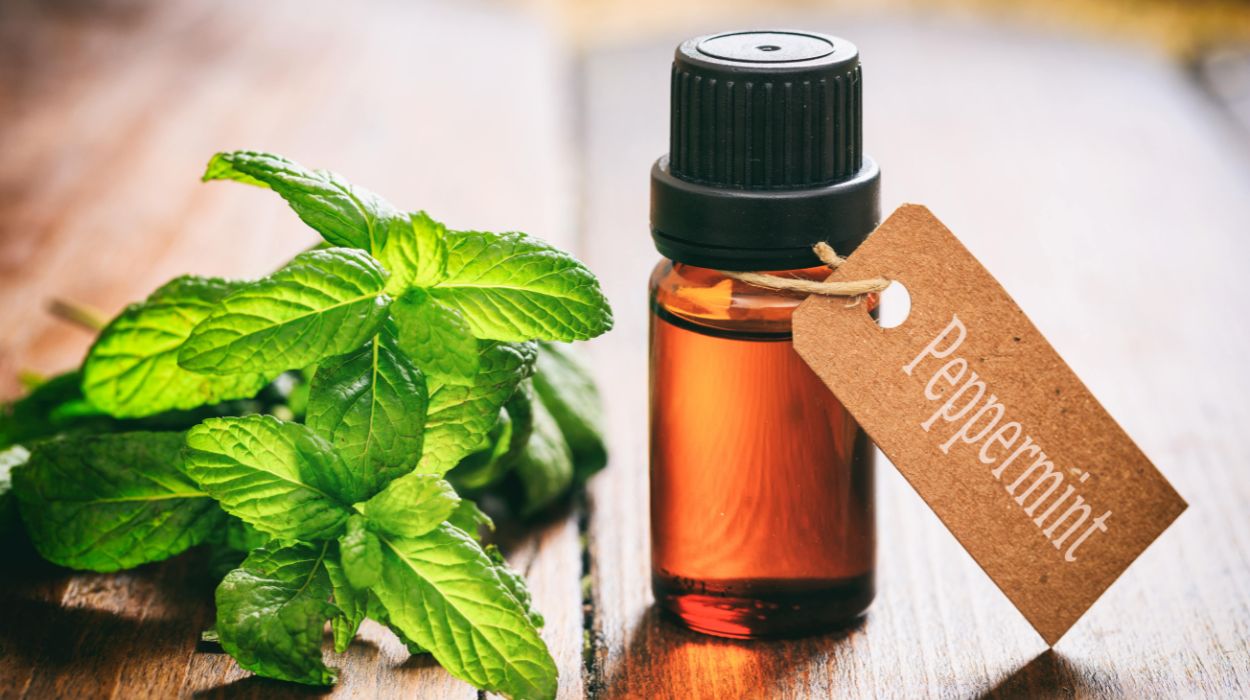
Peppermint oil is one of the best essential oils for hair loss and growth and is known for its peculiar aroma. It has been acclaimed to cause hair growth without toxic signs.[11] Instead, it gives a cool, soothing feeling on your scalp that vasodilates the vessels and improves circulation.
This is because peppermint oil contains menthol, which has a cooling effect. Menthol has a stimulating effect on the scalp and helps increase blood flow to the hair follicles. It strengthens the hair and prevents it from falling out, which can help strengthen hair follicles and prevent hair breakage.
Thyme Essential Oil
Try thyme today if you want oils for hair growth and thickness. Thyme essential oil is a powerful oil with a warm, herbaceous scent extracted from the leaves and flowers of the thyme plant. It has a long history of use in traditional medicine and aromatherapy and is known for its many health benefits.
There has also been a lot of research that ties thyme essential oil to hair growth.[12] The research is undefined for now, but many beauty practitioners strongly recommend it as one of the best essential oils for hair growth. Generally, it has natural antifungal properties that can help to fight dandruff and other scalp irritations.
Tea Tree Essential Oil
Another one of the essential oils for thicker hair is tea tree oil. It is undoubtedly the best oil for hair growth or at least one of them. It helps in combating hair loss, especially in medical conditions.[13]
A study found that a combination of lavender and tea tree oils may have potential efficacy in treating mild unknown, unwanted excessive hair growth (hirsutism)[14] in young women. The study involved 12 female patients and showed a significant decrease in hirsutism score and hair thickness after three months of daily topical application of a solution containing lavender and tea tree oils.
Is Using Essential Oils For Hair Growth Effective?
Essential oils[1] have been used for centuries for their therapeutic properties. They have recently gained popularity in promoting hair health and growth. These concentrated plant extracts boast a range of benefits, from stimulating hair growth to combating scalp issues.
Still, are they effective? Some essential oils, such as rosemary, lavender, and peppermint, have been studied for their ability to promote hair growth through various mechanisms.[2] This shows documented results of using a few drops of essential oils for hair regrowth.
Benefits Of Essential Oils For Hair
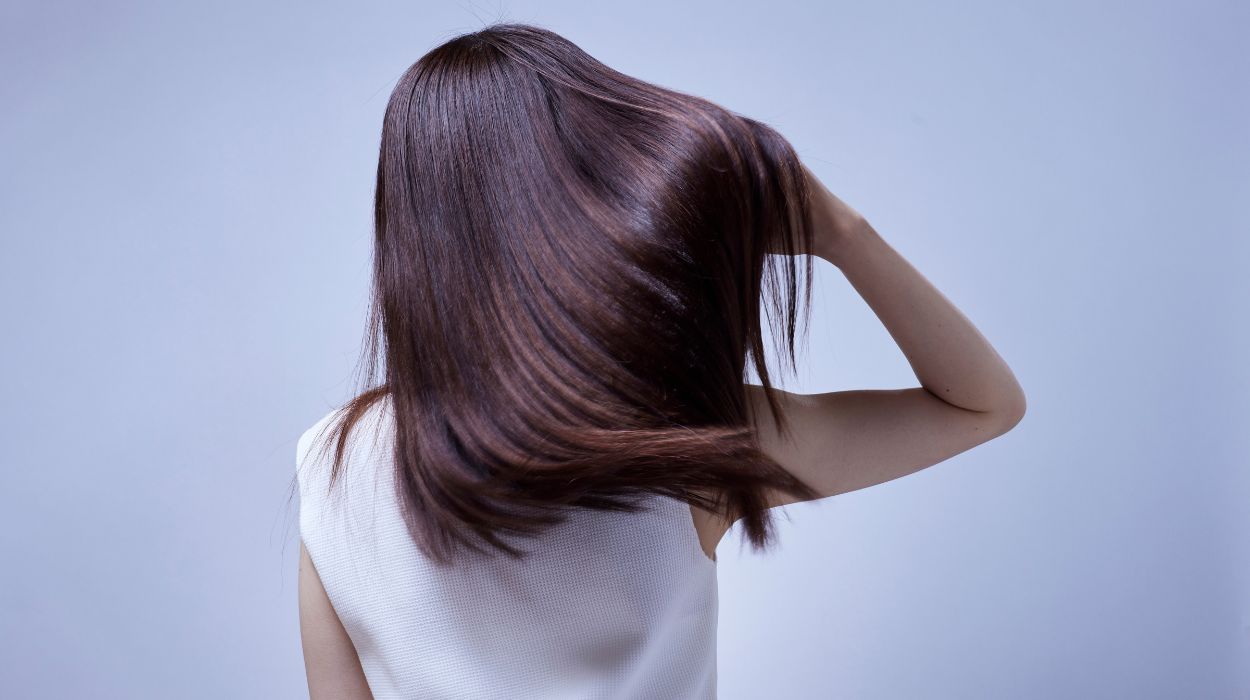
Let’s explore some of the benefits of essential oils for hair:
- Promotes Hair Growth: Essential oils stimulate hair growth[3] by way of oils that increase blood flow to the scalp. Improved blood circulation nourishes hair follicles and encourages healthy hair growth.
- Strengthens Hair: Essential oils help strengthen hair strands by nourishing and repairing damaged hair[4]. Regularly using these oils can reduce breakage, split ends, and hair loss.
- Balanced Scalp Conditions: Essential oils have natural antimicrobial, antifungal, and anti-inflammatory properties[5] that can help address various scalp issues.
- Adds Shine and Luster: Some essential oils can naturally enhance the shine and luster of your hair. These oils smooth the hair cuticle, reduce frizz, and help your hair look healthier and more vibrant.
- Reduces Hair Loss: Essential oils minimize hair loss by strengthening hair follicles and preventing excess shedding. They can also help promote new hair growth.[4]
- Natural Fragrance: Essential oils offer numerous benefits for hair health and a pleasant, natural fragrance. Oils like lavender, jasmine, and rose give your hair a fresh, soothing scent without the need for artificial fragrances.
How To Use An Essential Oil For Your Hair
After discovering all the benefits of oils for hair growth, you are probably wondering how to use essential oils for hair. Your reasons might be to improve hair growth, shine, or split ends. There are different ways to address it. Let’s see how to mix oils for hair growth and thickness;
- Choose the right essential oil: Research and select an essential oil that suits your specific hair needs. For example, lavender oil promotes hair growth, Cedarwood oil fights dandruff, and rosemary oil prevents hair loss.
- Dilute the essential oil: Essential oils are highly concentrated and can cause irritation if applied directly essential oils for the scalp. Dilute the essential oil with carrier oils such as coconut, jojoba, or almond. A general rule of thumb is to use 2-3 drops of essential oil per tablespoon of carrier oil.
- Apply the diluted oil mixture to your scalp: Gently massage your favorite oil mixture into your scalp using your fingertips. Leave the oil in your hair for at least 30 minutes or overnight for maximum benefits.
- Wash out the oil: After the desired time, wash your hair thoroughly using a gentle shampoo to remove the oil. Finish by conditioning your hair as usual.
Conclusion
Essential oils are a useful and natural way to promote growth, reduce loss, and maintain healthy hair. The properties are underrated, and more people should try them out. Remember, consult a healthcare professional or aromatherapist if you have any concerns or questions about using essential oils for your hair and scalp.
+ 14 sources
Health Canal avoids using tertiary references. We have strict sourcing guidelines and rely on peer-reviewed studies, academic researches from medical associations and institutions. To ensure the accuracy of articles in Health Canal, you can read more about the editorial process here
- Ramsey (2020). Essential Oils and Health. The Yale journal of biology and medicine, [online] 93(2). Available at: https://pubmed.ncbi.nlm.nih.gov/32607090/.
- Patel, S., Sharma, V., Chauhan, N., Thakur, M. and Dixit, V.K. (2015). Hair Growth: Focus on Herbal Therapeutic Agent. Current Drug Discovery Technologies, [online] 12(1), pp.21–42. doi:https://doi.org/10.2174/1570163812666150610115055.
- Lee, B.H., Lee, J.S. and Kim, Y.C. (2016). Hair Growth-Promoting Effects of Lavender Oil in C57BL/6 Mice. Toxicological Research, [online] 32(2), pp.103–108. doi:https://doi.org/10.5487/tr.2016.32.2.103.
- Panahi (2015). Rosemary oil vs minoxidil 2% for the treatment of androgenetic alopecia: a randomized comparative trial. Skinmed, [online] 13(1). Available at: https://pubmed.ncbi.nlm.nih.gov/25842469/.
- D’agostino, Tesse, Frippiat, Machouart and Debourgogne (2019). Essential Oils and Their Natural Active Compounds Presenting Antifungal Properties. Molecules, [online] 24(20), p.3713. doi:https://doi.org/10.3390/molecules24203713.
- Han, X., Rodriguez, D. and Parker, T.L. (2017). Biological activities of frankincense essential oil in human dermal fibroblasts. Biochimie Open, [online] 4, pp.31–35. doi:https://doi.org/10.1016/j.biopen.2017.01.003.
- Murata, K., Noguchi, K., Kondo, M., Onishi, M., Watanabe, N., Okamura, K. and Matsuda, H. (2012). Promotion of Hair Growth byRosmarinus officinalisLeaf Extract. Phytotherapy Research, [online] 27(2), pp.212–217. doi:https://doi.org/10.1002/ptr.4712.
- Huang, K., Liu, R., Zhang, Y. and Guan, X. (2021). Characteristics of two cedarwood essential oil emulsions and their antioxidant and antibacterial activities. Food Chemistry, [online] 346, p.128970. doi:https://doi.org/10.1016/j.foodchem.2020.128970.
- Blaskó, Á., Gazdag, Z., Gróf, P., Máté, G., Sárosi, S., Krisch, J., Vágvölgyi, C., Makszin, L. and Pesti, M. (2016). Effects of clary sage oil and its main components, linalool and linalyl acetate, on the plasma membrane of Candida albicans: an in vivo EPR study. Apoptosis, [online] 22(2), pp.175–187. doi:https://doi.org/10.1007/s10495-016-1321-7.
- Thom E (2016). Stress and the Hair Growth Cycle: Cortisol-Induced Hair Growth Disruption. Journal of drugs in dermatology : JDD, [online] 15(8). Available at: https://pubmed.ncbi.nlm.nih.gov/27538002/.
- Oh, J.Y., Park, M.A. and Kim, Y.C. (2014). Peppermint Oil Promotes Hair Growth without Toxic Signs. Toxicological Research, [online] 30(4), pp.297–304. doi:https://doi.org/10.5487/tr.2014.30.4.297.
- Salehi, B., Mishra, A.P., Shukla, I., Sharifi-Rad, M., Contreras, M. del M., Segura-Carretero, A., Fathi, H., Nasrabadi, N.N., Kobarfard, F. and Sharifi-Rad, J. (2018). Thymol, thyme, and other plant sources: Health and potential uses. Phytotherapy Research, [online] 32(9), pp.1688–1706. doi:https://doi.org/10.1002/ptr.6109.
- JC; (2020). The Use of Natural Ingredients in the Treatment of Alopecias with an Emphasis on Central Centrifugal Cicatricial Alopecia: A Systematic Review. The Journal of clinical and aesthetic dermatology, [online] 13(8). Available at: https://pubmed.ncbi.nlm.nih.gov/33178378/.
- Tirabassi (2013). Possible efficacy of Lavender and Tea tree oils in the treatment of young women affected by mild idiopathic hirsutism. Journal of endocrinological investigation, [online] 36(1). doi:https://doi.org/10.3275/8766.



